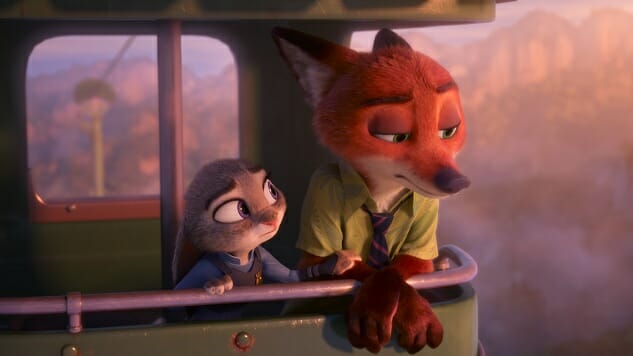Zootopia

Dear parents: It is March of 2016, and the current frontrunner for the Republican party’s presidential nomination is a bloviating, dissembling narcissist with a talent for fomenting xenophobia. Please take your kids to see Zootopia. Kendrick Lamar and Beyoncé Knowles have both been accused of racism for performing songs that celebrate and solemnize black experiences on national television. Please take your kids to see Zootopia. Sunday’s Academy Awards ceremony undercut its own entreatments for inclusion with tone-deaf ethnic jokes plus blatant pandering. Please take your kids to see Zootopia.
It says a lot about the state of America’s cultural dialogues on acceptance and discrimination that a Disney movie feels this urgent, but maybe a movie about animals living under the impression of harmony is a long-term solution for our short-term failures. Then again, we’re talking about a cartoon where TV’s Snow White teams up with Michael Bluth in a sort-of riff on 48 Hours that expands to include references to The Godfather and Breaking Bad. Suggesting that Zootopia packs enough meaningful education on the insidiousness of bigotry to cleanse all traces of prejudices from our future generations puts too much pressure on the film. You need more than cuteness wrapped around a social message to affect that kind of change.
So what, though? Zootopia is good, bordering on great. Better than that, it’s smart in the way it approaches race relations, if unsophisticated and childish. But there are worse things a children’s movie can be than childish, and in Zootopia that word sheds its pejorative implications and instead feels befitting in its innocence. The story takes place in the sprawling zoological metropolis of the title, a place where beasts of all makes and models—large and small, meek and ferocious—somehow manage to coexist in an approximation of civilized society. You may rightly wonder why or how predators ever managed to evolve beyond their primal need to hunt, kill and eat lesser animals, but you would be missing the point. This is the driving theme of the entire movie: that we need not be defined by what we look like or by the expectations of others. We are who we choose to be. Anyone can be anything.
Take, for example, Zootopia’s plucky protagonist, Judy Hopps (Ginnifer Goodwin). From the days of her youth she is bound and determined to grow up to be a cop, against the wishes of her anxious parents (Don Lake and Bonnie Hunt) and in utmost defiance of her schoolyard bully’s taunts. But grow up to be a cop she does, and off to Zootopia she goes to serve its citizens alongside a law enforcement body comprised of hippos and elephants, rhinoceri and cheetahs, Cape buffaloes and, well, pretty much any other kind of critter you can imagine. In contrast to Judy, there’s Nick (Jason Bateman), a streetwise fox with an airtight hustling game that’d put Irving Rosenfeld to shame. Nick doesn’t care what other people think of him, and so he’s totally fine with shouldering the burden of stereotyping.
-

-

-

-

-

-

-

-

-

-

-

-

-

-

-

-

-

-

-

-

-

-

-

-

-

-

-

-

-

-

-

-

-

-

-

-

-

-

-

-








































